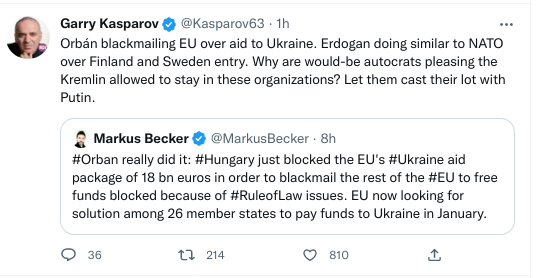Post by LFC on Aug 9, 2021 21:35:05 GMT
I've posted multiple things about Rod Dreher's adoration of the budding autocracy in Hungary. As expected from him anymore he can excuse away almost anything if he feels it benefits his side, with all the right caveats the occasional "tsk tsk." But the fact is that he is clearly more comfortable with an autocratic gov't that protects his preferred religion at the expense of others than the democracy he lives in.
TPM points out that although it took him a while Tucker Carlson is now on the Orbán train. What I never realized is that the embrace by America's right is at least a decade old and it's getting stronger. It's also interesting that an Republican strategist who grew up Jewish (I looked it up) named of Arthur Finkelstein should have so thoroughly embraced many of the same techniques promoted by Joseph Goebbels.
Carlson is actually a latecomer to the American right’s love affair with Orbán, even though he shares common cause with the demagogue who has claimed Hungarians oppose immigration because they do not want their “own color, traditions and national culture to be mixed by others.” The American right’s love affair with Orbán dates back at least a decade, and was cultivated by top strategists and lobbyists in the Republican Party, as well as leading figures in the religious right.
In 2008, Orbán, who had served one term as prime minister from 1998 to 2002 and was plotting a return to power, retained the Republican political strategist Arthur J. Finkelstein, mentor to such luminaries as Roger Stone and Paul Manafort. In the United States, Finkelstein’s signature advice to clients was to adopt messages that would “polarize the electorate.” Two years later, Orbán was again prime minister. His Fidesz-controlled government promptly undertook a host of anti-democratic measures, including requiring media organizations to register with the government, eroding checks and balances, constitutionally mandating a “right to life” from the moment of conception, and defining marriage as between a man and a woman. The party also redrew parliamentary districts and changed the process for allocating parliamentary seats, further cementing its hold on power, and stacked the courts with loyalists. Along the way Orbán engaged in a relentless anti-Semitic campaign against George Soros, demonized immigrants, and closed Hungary’s borders.
Finkelstein reveled in that kind of divisiveness. In rare public remarks in Prague in 2011, the strategist enthused about strongmen on the rise around the world, exploiting the refugee crisis to manufacture anti-immigrant and anti-Muslim animus. “Anti-Muslim parties become important in developing coalitions for their governments,” he said, with a message of, “they’re taking our jobs. They’re taking away our way of life.” That kind of scapegoating, he said, “is creating an energy source around which these movements take place.” A political consultant’s job, said Finkelstein, is to tell people what they should know because “no one knows anything about anything,”
In 2008, Orbán, who had served one term as prime minister from 1998 to 2002 and was plotting a return to power, retained the Republican political strategist Arthur J. Finkelstein, mentor to such luminaries as Roger Stone and Paul Manafort. In the United States, Finkelstein’s signature advice to clients was to adopt messages that would “polarize the electorate.” Two years later, Orbán was again prime minister. His Fidesz-controlled government promptly undertook a host of anti-democratic measures, including requiring media organizations to register with the government, eroding checks and balances, constitutionally mandating a “right to life” from the moment of conception, and defining marriage as between a man and a woman. The party also redrew parliamentary districts and changed the process for allocating parliamentary seats, further cementing its hold on power, and stacked the courts with loyalists. Along the way Orbán engaged in a relentless anti-Semitic campaign against George Soros, demonized immigrants, and closed Hungary’s borders.
Finkelstein reveled in that kind of divisiveness. In rare public remarks in Prague in 2011, the strategist enthused about strongmen on the rise around the world, exploiting the refugee crisis to manufacture anti-immigrant and anti-Muslim animus. “Anti-Muslim parties become important in developing coalitions for their governments,” he said, with a message of, “they’re taking our jobs. They’re taking away our way of life.” That kind of scapegoating, he said, “is creating an energy source around which these movements take place.” A political consultant’s job, said Finkelstein, is to tell people what they should know because “no one knows anything about anything,”
Finkelstein is dead. Good.



